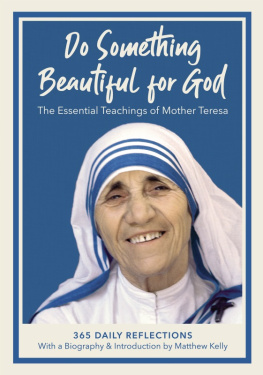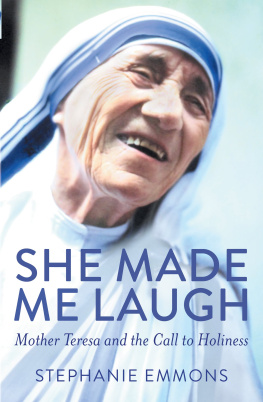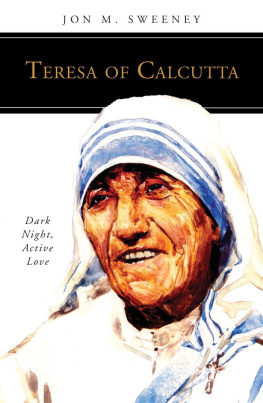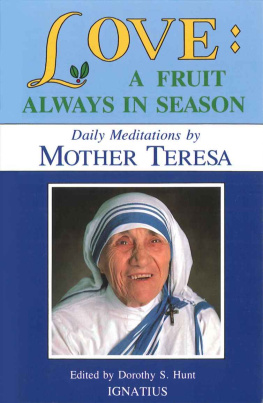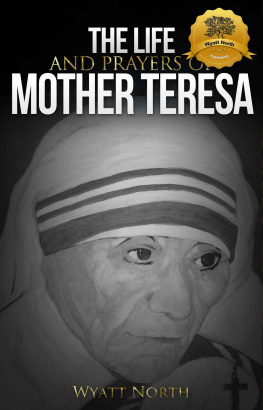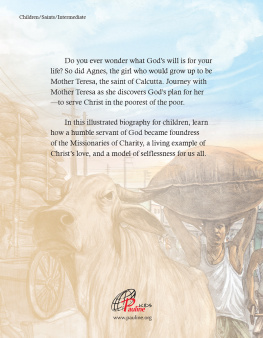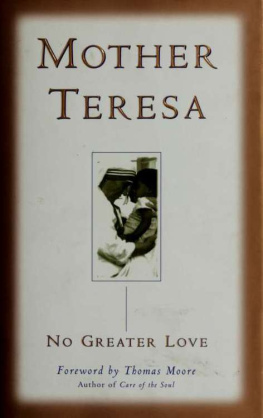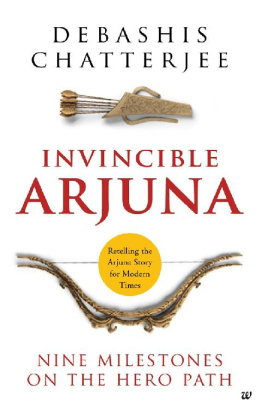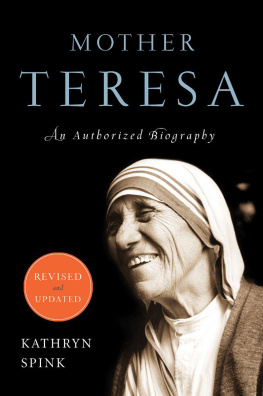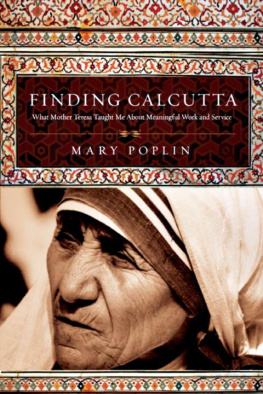Aroup Chatterjee - Mother Teresa - The Untold Story
Here you can read online Aroup Chatterjee - Mother Teresa - The Untold Story full text of the book (entire story) in english for free. Download pdf and epub, get meaning, cover and reviews about this ebook. year: 2016, publisher: Fingerprint Publishing, genre: Religion. Description of the work, (preface) as well as reviews are available. Best literature library LitArk.com created for fans of good reading and offers a wide selection of genres:
Romance novel
Science fiction
Adventure
Detective
Science
History
Home and family
Prose
Art
Politics
Computer
Non-fiction
Religion
Business
Children
Humor
Choose a favorite category and find really read worthwhile books. Enjoy immersion in the world of imagination, feel the emotions of the characters or learn something new for yourself, make an fascinating discovery.

- Book:Mother Teresa - The Untold Story
- Author:
- Publisher:Fingerprint Publishing
- Genre:
- Year:2016
- Rating:3 / 5
- Favourites:Add to favourites
- Your mark:
- 60
- 1
- 2
- 3
- 4
- 5
Mother Teresa - The Untold Story: summary, description and annotation
We offer to read an annotation, description, summary or preface (depends on what the author of the book "Mother Teresa - The Untold Story" wrote himself). If you haven't found the necessary information about the book — write in the comments, we will try to find it.
Mother Teresa - The Untold Story — read online for free the complete book (whole text) full work
Below is the text of the book, divided by pages. System saving the place of the last page read, allows you to conveniently read the book "Mother Teresa - The Untold Story" online for free, without having to search again every time where you left off. Put a bookmark, and you can go to the page where you finished reading at any time.
Font size:
Interval:
Bookmark:


Published by
F i NGER PRINT!
An imprint of Prakash Books India Pvt. Ltd.
113/A, Darya Ganj, New Delhi-110 002,
Tel: (011) 2324 7062 65, Fax: (011) 2324 6975
Email:
 www.facebook.com/fingerprintpublishing
www.facebook.com/fingerprintpublishing
 www.twitter.com/FingerprintP, www.fingerprintpublishing.com
www.twitter.com/FingerprintP, www.fingerprintpublishing.com
Copyright 2016 Prakash Books India Pvt. Ltd.
Copyright Text Aroup Chatterjee
All rights reserved. No part of this publication may be reproduced, stored in a retrieval system or transmitted in any form or by any means, electronic, mechanical, photocopying, recording or otherwise (except for mentions in reviews or edited excerpts in the media) without the written permission of the publisher.
ISBN: 978 81 7599 396 9
Dedicated to
Individualists, Iconoclasts and Single Issue Fanatics
Gratitude is overdue to my wife Zelpha and my daughters Ophelia and Allegra for their patience and understanding of my unorthodox family commitments while researching and writing this book. Thanks also to Bhagbat Chakraborty of Meteor Books, who had the rare courage in India to publish it in 2003, overcoming the (still very much prevalent) Indian fear of challenging a white icon with wide vested interests. My agent Kanishka Gupta (an obsessive bibliophile and a true professional) deserves special mention.
Mother Teresa once made me cry. The year was 1988 and I was on one of my frequent visits home to Calcutta after moving to Britain in 1985. I was standing by the kerbside at Gariahat crossing, munching on the famous mutton roll. I was looking at scenes I had grown up with: pavements almost obliterated by shops, people having to weave their way through hawkers peddling their fares, buses belching out black diesel smoke, tilted to one side by the sheer weight of passengers, trams waiting for a manual change of tracks before they could turn, and the familiar neon sign of an astrologer.
In the midst of all this, I remembered the Calcutta as perceived by the West; Calcutta the metaphor, not the city. In my three years in the West I had come to realise that the city had become synonymous with the worst of human suffering and degradation in the eyes of the world. The imagined Calcutta contained a multitude of sewers and gutters where endless numbers of dead and dying people lay; but they did not lie for long, as roving angels in the shape of the followers of a certain nun would be seeking them. Then they would whisk them away in their smart ambulances. In my twenty-seven continuous years in Calcutta I had never seen such a scene and neither have I met a Calcuttan who has. It hurt me deeply that such an erroneous stereotype had become permanently ingrained in the worlds psyche. I felt overwhelmingly sad that a city, indeed an entire culture, should be continuously insulted in this way.
I am Calcuttan, born and bred, and our family has lived in the city for as long as it can be traced. I know Calcutta well, and many people who matter there, and many more who do not. The place has made me what I am, warts and all. My mother tongue is Bengali, the language of Calcutta, but I speak Hindi passably, which is spoken by a large number of the destitute of Calcutta.
I had no interest whatsoever in Mother Teresa before I came to England. A Westerner may find this difficult to comprehend, but she was not a significant entity in Calcutta in her lifetime; paradoxically, posthumously her image has risen significantly there.
I had an interest in the destitute of Calcutta during my college days, when I dabbled in leftist politics for a while. I also took a keen interest in human rights issues. Never in the course of my (modest) interaction with the very poor of Calcutta, did I cross paths with Mother Teresas organisation indeed I cannot even recall her name being uttered.
After living in the West for some time I came to realise what Mother Teresa and Calcutta meant to the world. It shocked and saddened me. In India itself, to say you come from Calcutta is considered trendy, as Calcuttans are believed, albeit wrongly, to be brainy and rebellious. In India, Calcutta is not entirely wrongly stereotyped as a seat of effete culture and anarchic politics. There is an Indian saying that goes thus: If you have one Calcuttan you have a poet; with two you have a political party, and with three you have two political parties.
The stereotype of Calcutta in the West did not irk me as much as did the belief that Mother Teresa had chosen to live there as its saviour. I was astonished that her name had become a figure of speech, invoked to qualify the extreme superlative of a positive kind; the idea being you can criticise God, but you cannot criticise Mother Teresa. In common parlance, doing the unthinkable is qualified as like criticising Mother Teresa. I have lost count of the number of times I have heard expressions such as that person would try the patience of Mother Teresa. Such expressions would cause incredulity and curiosity in Calcutta, even amongst Mother Teresas most ardent admirers.
Why I decided to do something about it, I cannot easily tell; as a person I am flawed enough to understand lies and deceit. Why certain people, themselves no pillars of rectitude, decide to make a stand against untruth and injustice is a very complex issue. I had support from my wife, raised as a Roman Catholic in Ireland, fed on Teresa mythology she felt angry and cheated when she went to Calcutta and saw how the reality compared with the fairy tale.
In February 1994 without any introduction, I rang Vanya Del Borgo at the television production company Bandung Productions in London. She listened to my anguished outpourings and, to cut a long story short, eventually Channel 4, a UK TV station decided to commission the film Hells Angel (shown on Britains Channel 4 television on 8 November 1994). This was the very first attempt to challenge the Teresa myth on television, presented by Western journalist and writer . I was disappointed that Hells Angel took a sensationalist approach (Hitchens refers to Mother Teresa as a presumed virgin). The film, however, caused ripples of interest and controversy, both in Britain and internationally.
Some might argue that since Mother Teresa is dead and therefore unable to defend herself against my charges, I should not besmirch her reputation now. However, criticisms of her peaked during her lifetime; apart from the November 1994 documentary, there was a stringent detailed attack on conditions in her orphanages in India (published in newspaper, London, 14 October 1996). Charges of gross neglect and physical and emotional abuse were made. The article alleged her own complicity and knowledge in the unacceptable practices that occurred and still continue in her homes. In January 1997, various European television channels broadcast a documentary Mother Teresa: Time for Change? which was critical of her working methods and accusing her of neglect.
Mother Teresa should have answered such criticisms during her lifetime; she did not. Her supporters would say she was like Jesus; that she would not demean herself by protesting against denigration but merely turn the other cheek. Notwithstanding her image, she was a robust protester whenever she had a case. Shortly before she died she got involved in legal wrangles with a US bakery over the marketing of a bun; and more seriously, with her one time close friend and ally, the author , one of the biggest documented fraudster in US history.
Font size:
Interval:
Bookmark:
Similar books «Mother Teresa - The Untold Story»
Look at similar books to Mother Teresa - The Untold Story. We have selected literature similar in name and meaning in the hope of providing readers with more options to find new, interesting, not yet read works.
Discussion, reviews of the book Mother Teresa - The Untold Story and just readers' own opinions. Leave your comments, write what you think about the work, its meaning or the main characters. Specify what exactly you liked and what you didn't like, and why you think so.

